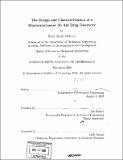The design and characterization of a microcalorimeter to aid drug discovery
Author(s)
McEuen, Scott Jacob
DownloadFull printable version (23.55Mb)
Other Contributors
Massachusetts Institute of Technology. Dept. of Mechanical Engineering.
Advisor
Ian Hunter.
Terms of use
Metadata
Show full item recordAbstract
This thesis describes the design and characterization of a microcalorimeter used to aid drug discovery. There are four key functional requirements for the device: (1.) 8.4 [mu]J energy resolution, (2.) 20 [mu]L reactant volume (combined total), (3.) 10% experimental variance, and (4.) 100 [mu]K baseline calorimeter drift over a two hour period. The calorimeter utilizes a novel heat sensor. This heat sensor combines thermal expansion and the dynamic response of an oscillating ribbon to transduce the signal from a heat event. A vacuum chamber improved the sensitivity of the sensor by approximately an order of magnitude by significantly reducing the losses due to air friction in the resonant sensor. Additional components such as a position sensor, temperature controlled vacuum chamber, software, and a syringe pump were constructed to complete the calorimeter system. The current calorimeter prototype nearly meets each functional requirement. In addition, the current sensitivity of the instrument is near that of a commercially available calorimeter but uses almost two orders of magnitude less solution. Finally, all of our calorimeter components are designed, built, integrated, and ready to begin more rigorous biological solution experimentation.
Description
Thesis (S.M.)--Massachusetts Institute of Technology, Dept. of Mechanical Engineering, 2008. Includes bibliographical references (leaves 61-62).
Date issued
2008Department
Massachusetts Institute of Technology. Department of Mechanical EngineeringPublisher
Massachusetts Institute of Technology
Keywords
Mechanical Engineering.